Overview
The primary focus of this article is to identify and discuss the key trends in industrial marketing anticipated for 2025. It underscores the critical role of data-driven insights, personalization, artificial intelligence, and innovative content strategies as essential components for enhancing customer engagement and driving business growth in the evolving industrial landscape. By leveraging these trends, businesses can position themselves strategically to thrive in a competitive environment.
Introduction
In a rapidly evolving industrial landscape, the strategies that once defined marketing are undergoing a profound transformation. As businesses prepare for 2025, the emphasis on data-driven insights, personalized experiences, and the integration of advanced technologies is reshaping how they connect with their audiences. This article explores seven key trends poised to redefine industrial marketing, providing insights into how companies can leverage these developments to enhance engagement and drive growth. With numerous changes on the horizon, organizations must navigate these emerging trends effectively to stay ahead of the competition.
Market Veep: Tailored Industrial Marketing Strategies for 2025
Market Veep is resolutely committed to developing customized promotional plans that meet the specific requirements of industrial marketing clients. In 2025, our focus will be on harnessing data-driven insights to create targeted campaigns that not only enhance engagement but also yield measurable results.
By thoroughly understanding the unique challenges within sectors such as manufacturing and energy, Market Veep formulates industrial marketing strategies that align with current industry trends, including:
- The increasing importance of zero-click SEO
- Video marketing
This strategic approach ensures that clients can adeptly navigate the evolving landscape, leveraging tailored solutions that resonate with their distinct operational goals.
Furthermore, by integrating automation and reporting, Market Veep empowers sales teams to identify opportunities for scaling activities without the necessity for additional hires.
Establishing robust monitoring systems will be essential for tracking progress and adjusting plans based on real-time data insights, ultimately promoting sustainable growth and maximizing ROI.
Personalization and Account-Based Marketing: Enhancing Customer Engagement
In 2025, personalization will serve as a cornerstone of industrial marketing approaches. Leveraging account-based strategies (ABM) empowers companies to customize their messaging and offerings for specific high-value clients, significantly enhancing customer engagement. This tailored approach fosters stronger relationships, resulting in increased loyalty and higher conversion rates. Notably, companies implementing ABM can witness revenue increases of over 200% when executed effectively, showcasing the power of this strategy in driving business growth.
Furthermore, 80% of B2B firms report utilizing hyper-personalization within their ABM strategies, reflecting a significant shift towards more tailored promotional efforts. As industrial sectors embrace these trends, the emphasis on industrial marketing and personalized experiences will be crucial for maintaining a competitive edge. Additionally, 76% of purchasers now expect greater personalized attention from solution providers compared to three years ago, underscoring the rising demand for personalization in B2B.
To achieve these goals, the implementation of clean, integrated systems will be essential for effectively segmenting audiences and delivering personalized content that aligns with the unique needs of each segment. At Market Veep, we emphasize the creation of measurable and data-driven strategies that align sales and promotional efforts, ensuring that your business objectives are met through real-time reporting and analytics. Our case studies demonstrate verified ROI and customized promotional solutions across various sectors, while our dedicated assistance and collaboration tools enhance your experience and efficiency.
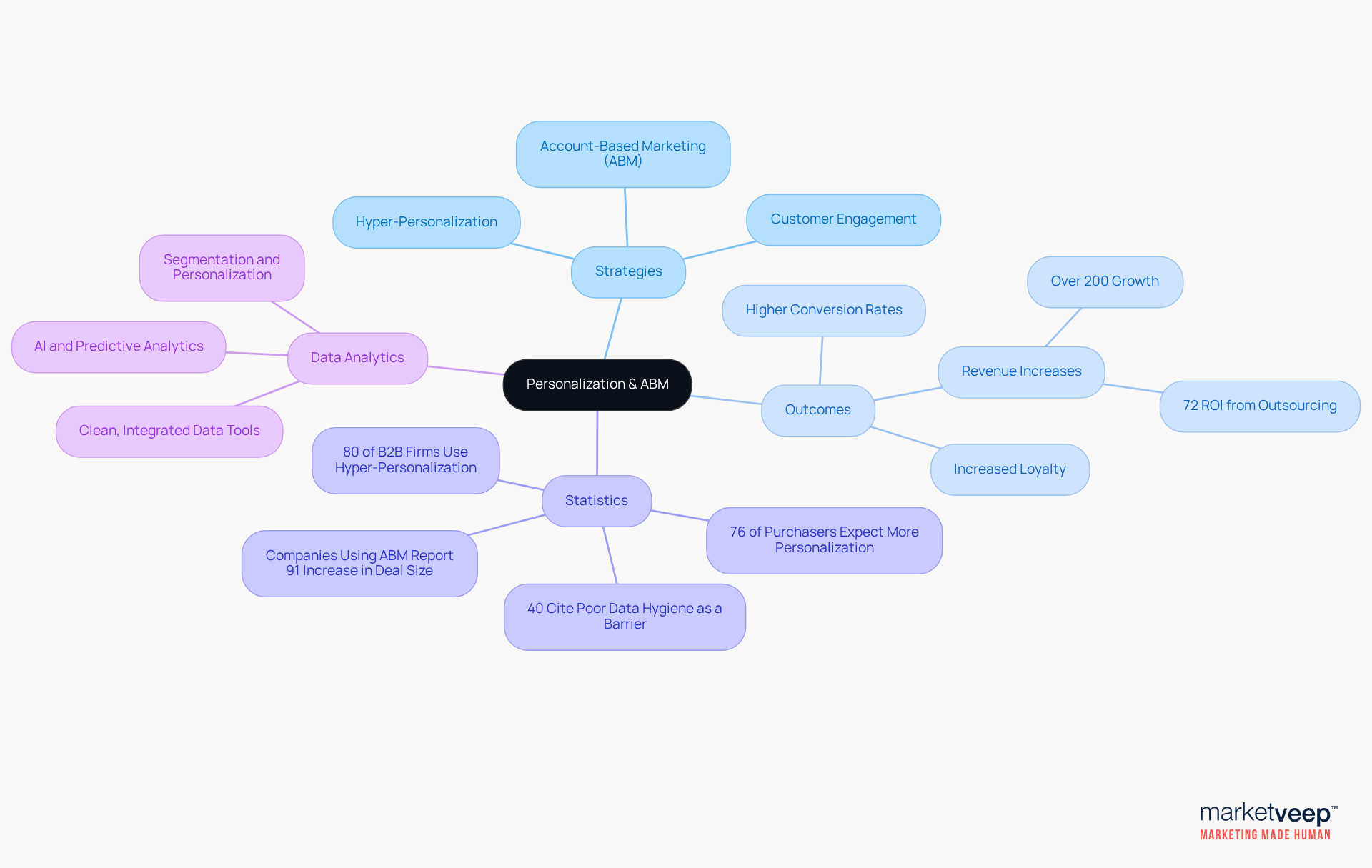
Artificial Intelligence: Revolutionizing Industrial Marketing Practices
Artificial intelligence is poised to revolutionize industrial marketing practices in 2025, delivering innovative solutions that enhance both efficiency and effectiveness. Predictive analytics, a cornerstone of AI, empowers marketers to anticipate customer behavior by scrutinizing extensive datasets. This capability allows for the identification of emerging trends and insights that inform strategic decision-making, culminating in more targeted and impactful promotional campaigns.
In 2025, statistics reveal that 95% of marketers intend to amplify their investments in AI technologies, acknowledging their potential to elevate revenue and streamline operations. AI tools will enable automated content creation, allowing marketers to produce personalized messages at scale, thereby enhancing engagement with target audiences.
Furthermore, AI-driven chatbots are set to transform customer interactions by offering real-time support and information to prospective clients. These tools not only improve response times but also gather invaluable data on customer preferences, further refining marketing strategies. As organizations increasingly integrate AI tools for predictive analytics, they will be better equipped to navigate the complexities of industrial marketing, which will ensure sustained growth and a competitive edge.
At Market Veep, we collaborate with your team to create, develop, and finalize leads, enhancing inbound sales strategies and automation for superior lead generation and customer experience. Our case studies demonstrate verified ROI and tailored promotional solutions across various sectors, showcasing tangible outcomes achieved for clients similar to you. To fully leverage these advantages, companies should assess their existing AI capabilities, contemplate the incorporation of AI into their promotional strategies, and explore specific sales automation tools that can optimize their processes for enhanced results.
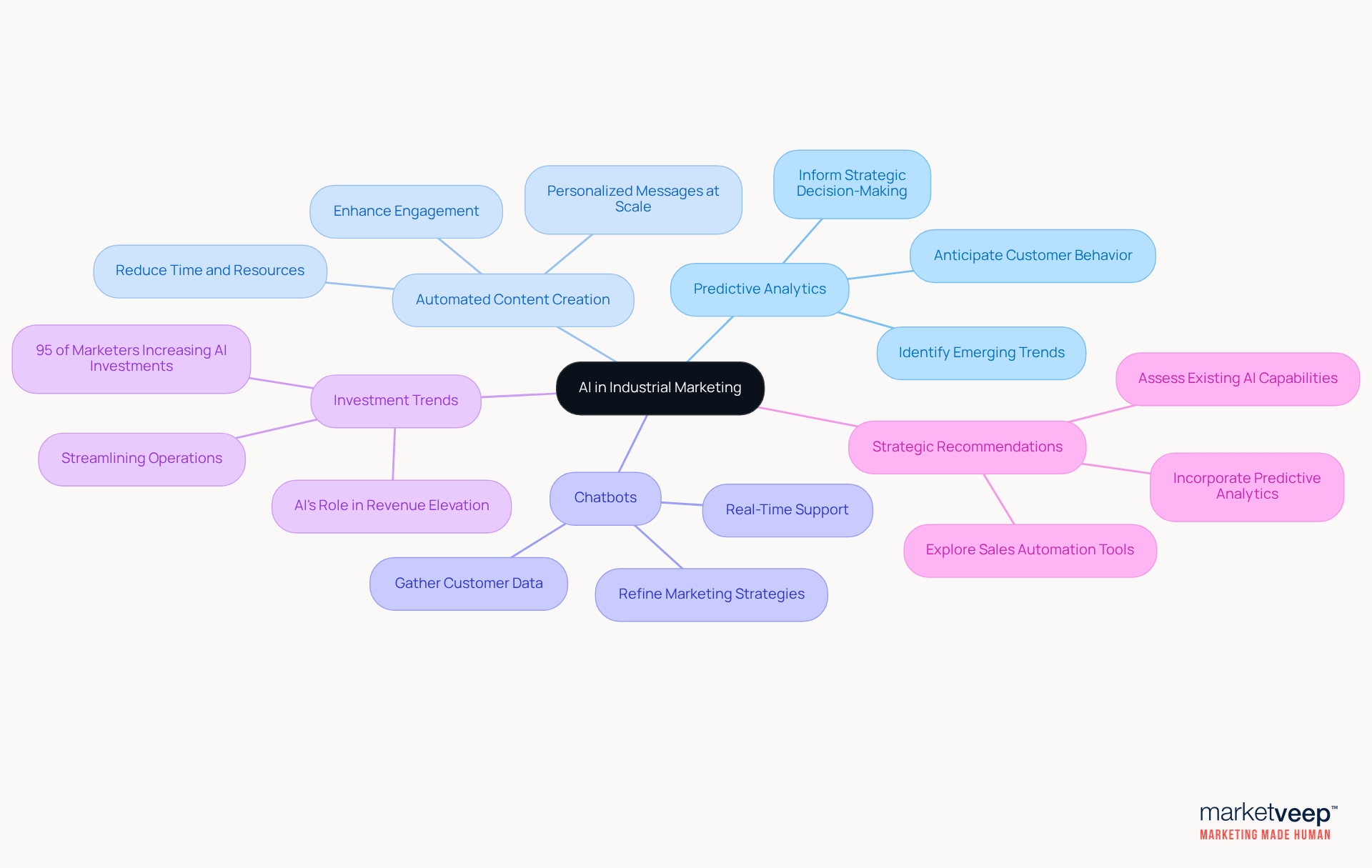
Content Marketing and Thought Leadership: Building Authority in the Industry
In 2025, content creation is poised to become a pivotal component for establishing authority within the manufacturing sector. By producing high-quality, informative content that tackles pressing industry challenges and highlights emerging trends, businesses can strategically position themselves as thought leaders. This method not only fosters trust among prospective customers but also significantly boosts brand visibility.
Regularly publishing white papers, case studies, and insightful articles allows companies to engage their audience in a meaningful way and showcase their expertise. For instance, Market Veep's case studies illustrate how strategic website redesign and optimization have yielded remarkable outcomes, including a 3X increase in organic traffic and a 25% rise in organic leads for manufacturers.
As B2B marketers increasingly acknowledge the value of thought leadership, the generation of insightful content will be crucial for nurturing buyer relationships and enhancing brand loyalty. With 88% of marketers already utilizing, leveraging advanced tools for content creation and distribution will further amplify these initiatives, ensuring that businesses maintain their competitive edge in a rapidly evolving landscape.
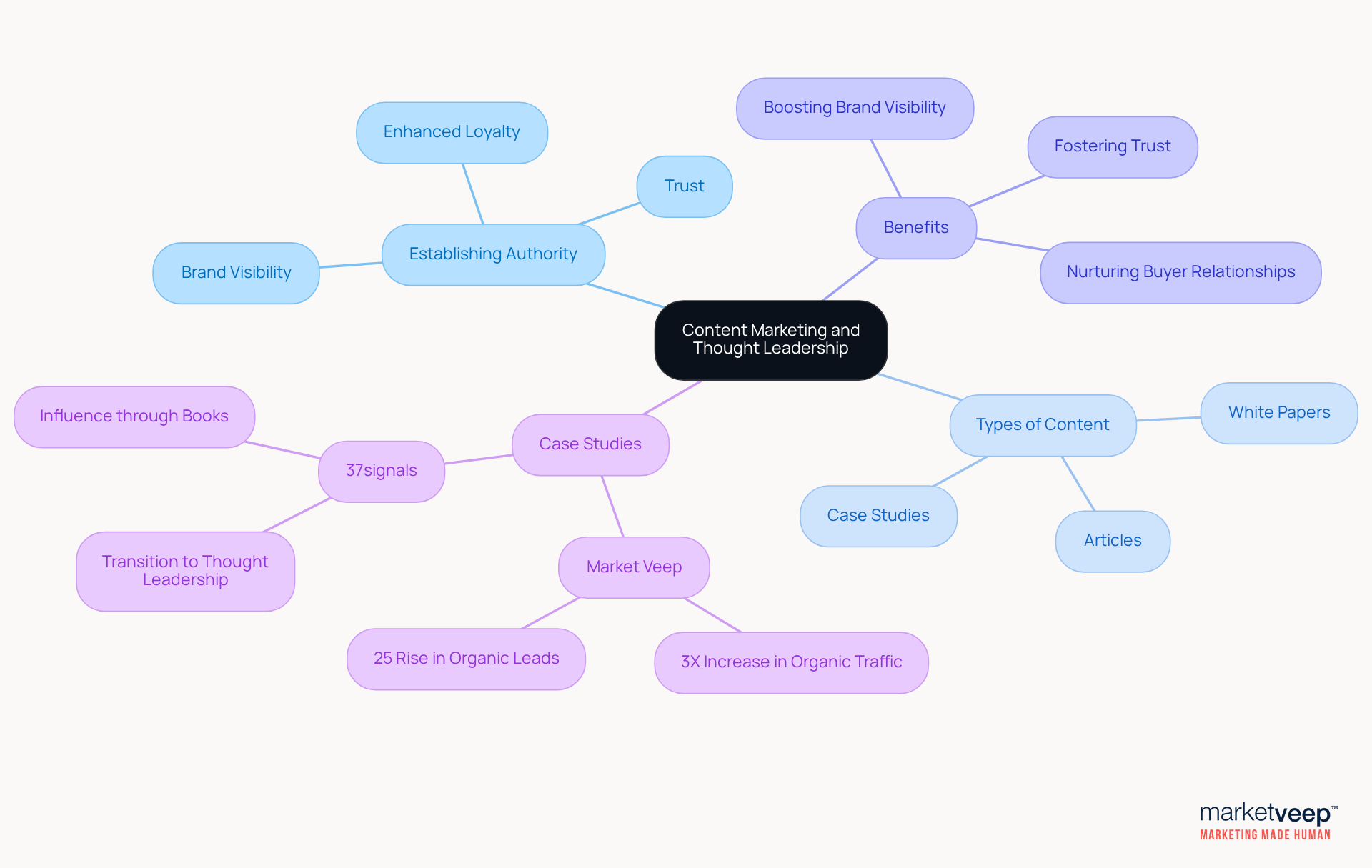
Video Marketing and Live Streaming: Engaging Audiences Effectively
In 2025, video promotion will continue to be an essential strategy for businesses engaged in industrial marketing, as they increasingly leverage both pre-recorded and live streaming formats to engage their audiences. Live streaming events—such as product launches and interactive Q&A sessions—facilitate real-time interaction with potential clients, fostering a sense of community and urgency that traditional promotional techniques often lack. This urgency not only enhances brand visibility but also cultivates trust and loyalty among audiences, aligning perfectly with Market Veep's tailored marketing strategies aimed at driving sales growth.
Furthermore, short-form videos are emerging as a powerful tool for conveying complex information succinctly, making them especially effective for showcasing industrial products and services. With 73% of consumers expressing a preference for to learn about offerings, businesses can capitalize on this format to quickly highlight key features and benefits. As the demand for engaging video content escalates, companies that embrace these strategies will be better positioned to capture attention and drive conversions in an increasingly competitive landscape, reflecting the customized solutions Market Veep provides for lead generation.
The effectiveness of live streaming in B2B promotion is underscored by its capacity to create interactive experiences that resonate deeply with audiences. For example, brands can conduct live demonstrations or behind-the-scenes tours, enabling viewers to engage directly with the content and pose questions in real time. This level of interaction not only enhances the viewer experience but also yields valuable insights into customer preferences and behaviors, which are crucial for developing effective promotional strategies.
As we progress further into 2025, the advantages of live streaming for industrial marketing will become increasingly evident. Organizations that invest in high-quality live content will not only amplify their promotional effectiveness but also strengthen their relationships with clients, ultimately driving sustainable growth in a rapidly evolving market. Market Veep's proven case studies will stand as a testament to the measurable ROI achieved through these customized promotional strategies.
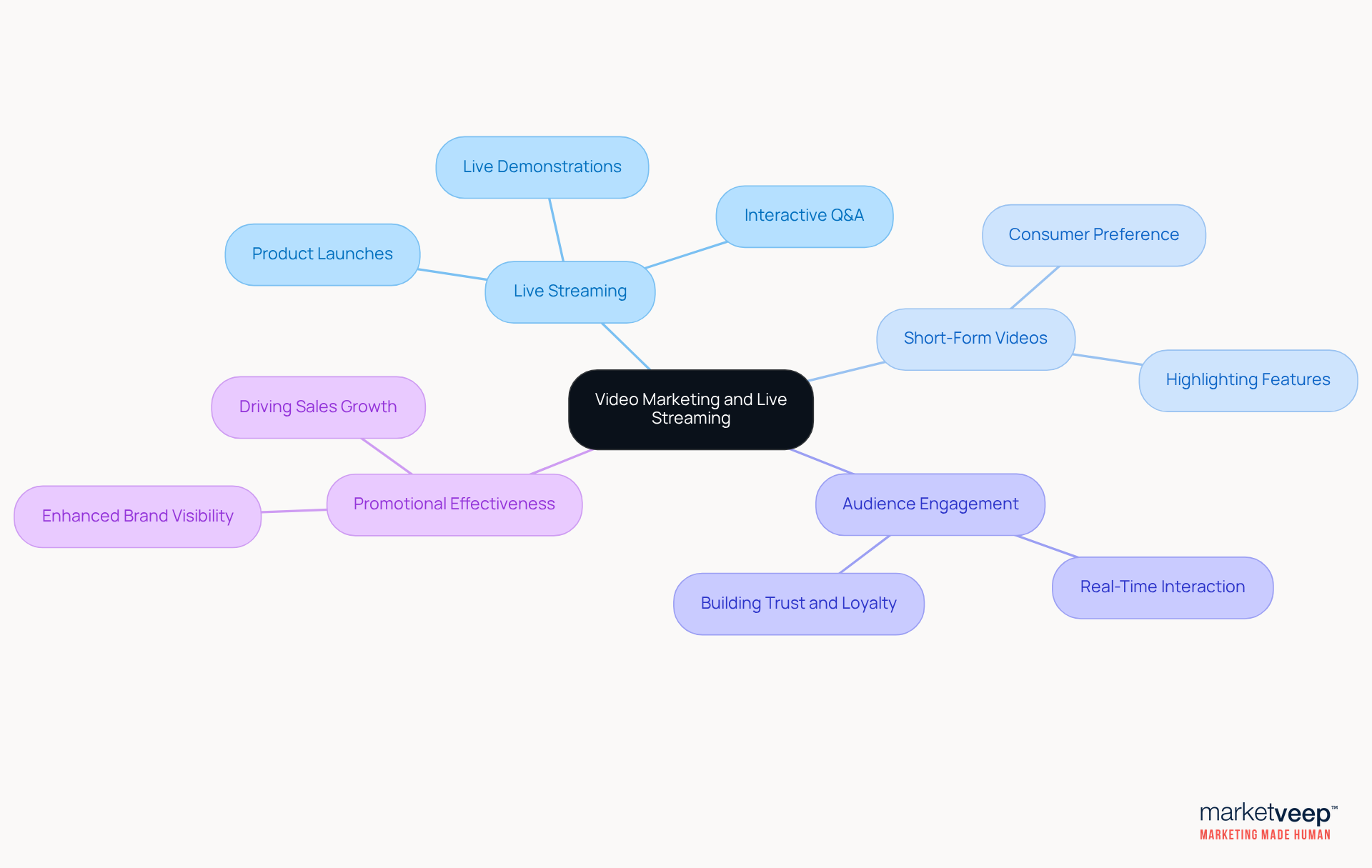
Conversational Marketing and Chatbots: Streamlining Customer Interactions
In 2025, conversational marketing will take center stage, with chatbots emerging as pivotal tools for enhancing customer interactions in the B2B landscape. These AI-driven solutions offer immediate responses to inquiries, effectively guiding users through the sales journey while collecting valuable insights into customer preferences. By integrating chatbots on websites and social media platforms, businesses can significantly improve customer service, ensuring that potential clients receive timely and relevant information. This proactive approach not only fosters engagement but also contributes to it, as 38% of customers are ready to make a purchase after a positive chat experience.
For instance, companies in the industrial marketing sector are leveraging chatbots to streamline their customer service processes, providing instant support for technical inquiries and product information. This capability is particularly beneficial in environments where timely responses are critical. As businesses increasingly adopt these technologies, the emphasis will be on creating seamless interactions that blend AI efficiency with the human touch, ensuring that customer relationships remain strong and responsive.
Market Veep's tailored promotional plans, including automation and sales materials, further enhance this approach by driving lead generation and sales growth. By collaborating with customers to apply customized promotional plans, businesses can enhance their inbound sales methods and automate customer interactions, ultimately elevating the overall customer experience. Expert views emphasize the importance of chatbots in contemporary promotional approaches, highlighting their function in minimizing friction during the buying process and improving overall customer satisfaction. As Niyati Budhiraja notes, customers expect brands to understand their unique preferences and deliver highly personalized experiences. As the landscape changes, businesses that successfully integrate chatbots with Market Veep's tailored approaches will not only enhance their operational efficiency but also establish enduring relationships with their clients. Furthermore, the importance of real-time interactions cannot be overstated, as they are essential for guiding customers through their journey and ensuring satisfaction.
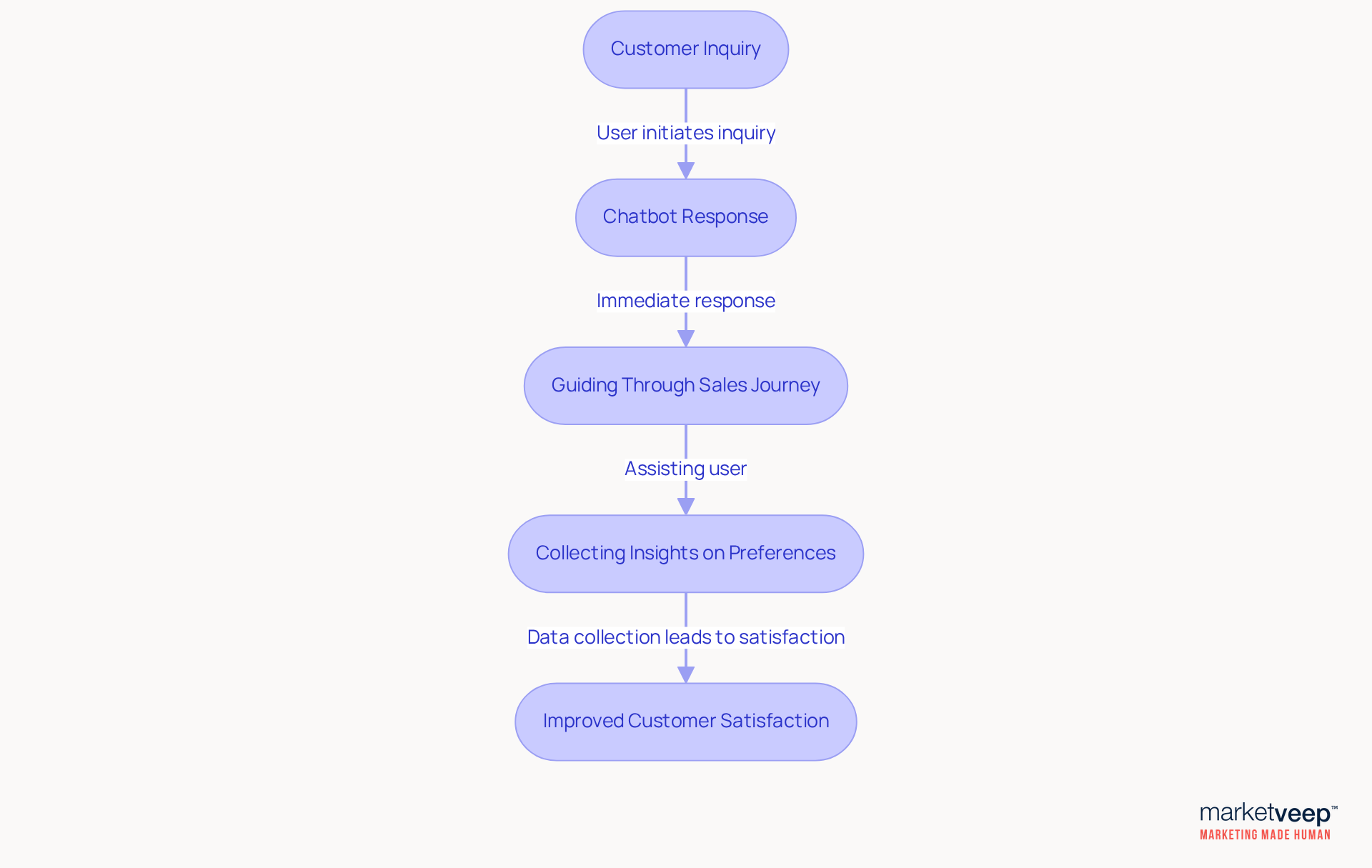
Challenges in Adopting Emerging Trends: Navigating the Industrial Marketing Landscape
As business marketing evolves, organizations face significant challenges in adopting emerging trends. A prevalent barrier is resistance to change, often rooted in established practices and a reluctance to embrace new technologies. Notably, 54% of CMOs have pinpointed AI planning development as a critical skill lacking within their teams, underscoring the urgent need for upskilling to effectively leverage new tools and counteract resistance to change.
Compounding these challenges are budget constraints, with numerous industrial companies struggling with limited resources in industrial marketing. A 2024 survey revealed that CMOs are concerned about wasting $30 million to $40 million on ineffective strategies, highlighting the pressing need for economical solutions. Projections indicate that by 2025, U.S. ad expenditure on mobile promotion will surpass $228 billion, with 82.3% of this spending anticipated to arise from in-app advertising. This situation accentuates the necessity for strategic fund allocation to maximize ROI.
To navigate these obstacles, organizations must proactively identify potential challenges and craft. Successful examples abound, particularly among companies that have adopted data-driven approaches, enabling them to optimize existing resources and enhance performance without incurring additional costs. By fostering a culture of flexibility and continuous education, alongside promoting cooperative problem-solving—a skill that has surged by 138% since 2021—companies can adeptly navigate resistance to change and thrive in the dynamic environment of industrial marketing. Moreover, employing KPI mapping can help organizations align their promotional strategies with measurable outcomes, ensuring effective resource distribution. Market Veep's flexible pricing model empowers clients to adjust their strategies without incurring extra costs, facilitating the implementation of these essential changes.
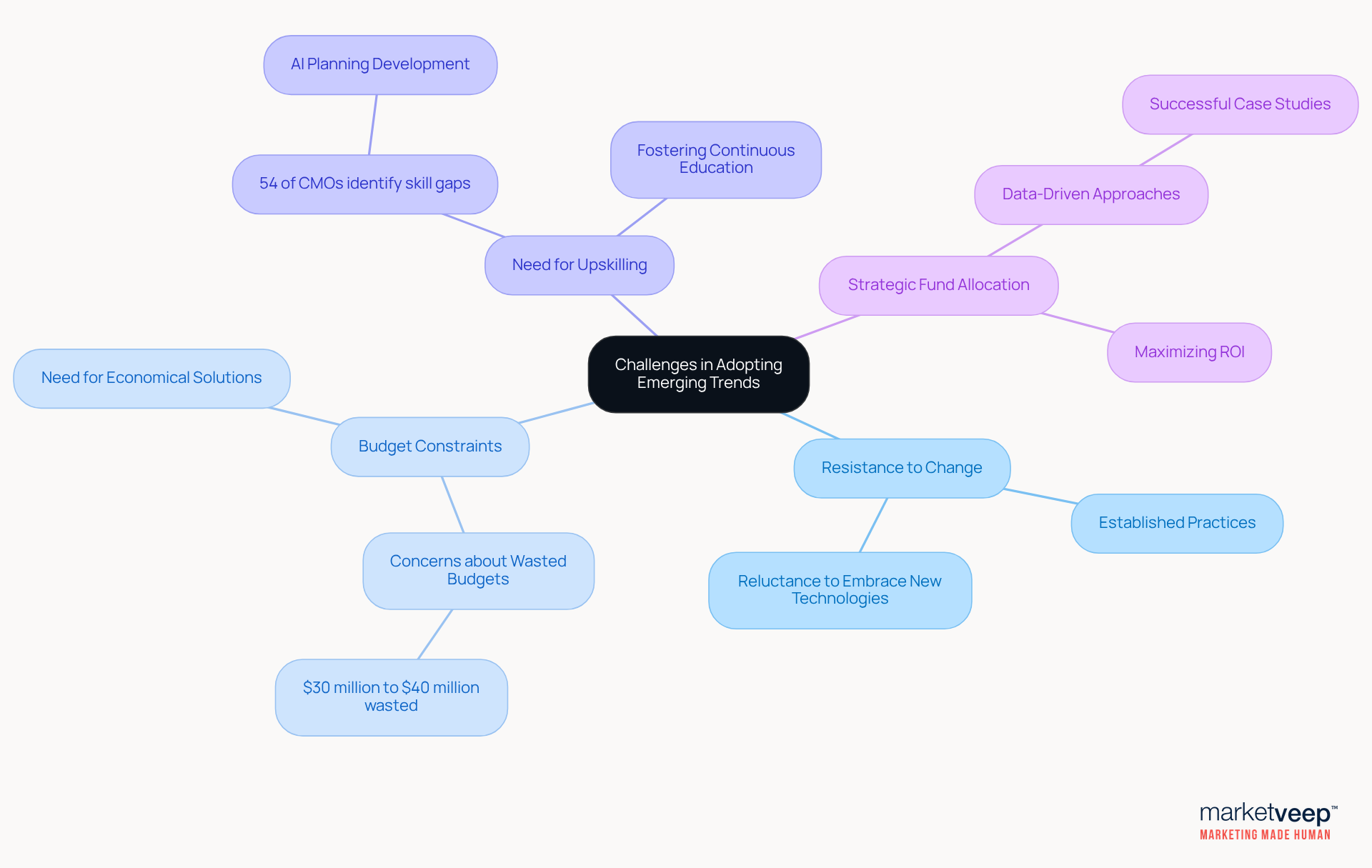
Strategies to Overcome Challenges: Ensuring Successful Trend Adoption
To effectively navigate the complexities of adopting, businesses must implement several strategic initiatives.
- Cultivating a culture of innovation and adaptability is paramount, as it mitigates resistance to change and encourages creative problem-solving.
- A psychologically safe workplace allows team members to share ideas without fear of criticism, fostering an environment conducive to innovation.
- Moreover, investing in continuous training programs is crucial for enhancing staff skills in new promotional technologies.
- Organizations that focus on employee growth can close knowledge gaps and improve their promotional abilities, resulting in enhanced performance. In fact, 93% of CEOs who implement upskilling programs observe their workforce being better prepared to handle new challenges.
Additionally, organizations should focus on scalable technologies that can evolve alongside their needs.
- This approach not only ensures competitiveness in a rapidly changing landscape but also facilitates the integration of advanced tools that enhance data analytics and customer engagement.
- For example, 35% of marketers intend to invest in AI optimization tools, acknowledging the significance of utilizing technology to enhance efficiency and effectiveness in promotional efforts.
Furthermore, cooperation with industry associates can accelerate the adoption of effective approaches, as shared insights and experiences can result in faster execution of best practices.
By adopting these approaches, business promotion teams can position themselves for sustained achievement in 2025 and beyond. A case study demonstrating this is Market Veep's achievement in tripling qualified leads for CHASM, highlighting the concrete results of effective approaches and customized solutions that drive measurable ROI.
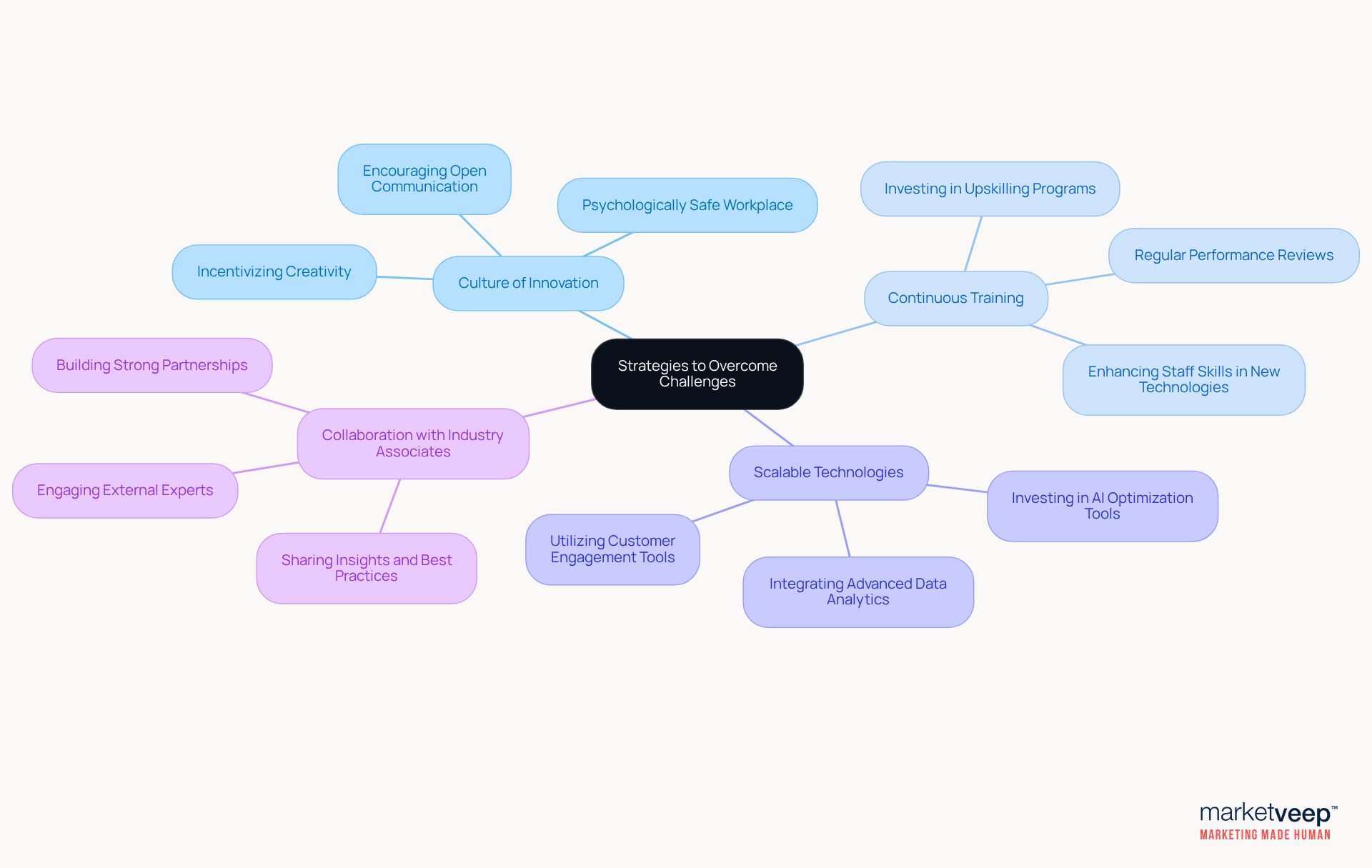
Historical Evolution of Industrial Marketing: Context for Future Trends
The historical evolution of industrial marketing exemplifies a remarkable transformation in strategies and practices over the decades. Initially, promotional efforts predominantly relied on direct sales and print advertising, which ruled the landscape. However, as technology advanced, a significant shift towards industrial marketing, including digital promotion and data analytics, emerged, fundamentally altering the way businesses engage with their audiences. This transition is underscored by the increasing importance of industrial marketing, which has become essential for forging lasting customer connections. For instance, firms that have embraced digital transformation strategies, such as those implemented by Market Veep, have reported an impressive threefold increase in organic traffic for manufacturing clients, underscoring the tangible benefits of these advancements.
Statistics reveal that companies leveraging data analytics in industrial marketing can significantly enhance their promotional effectiveness, with many achieving higher conversion rates through targeted campaigns. The rise of account-based marketing (ABM) exemplifies the trend in industrial marketing, enabling companies to concentrate on high-value accounts with tailored strategies that resonate with specific decision-makers. Market Veep's case studies, available on our website, illustrate proven ROI and customized solutions across various industries, reinforcing the efficacy of our data-driven approach.
Furthermore, the integration of AI and automation tools in industrial marketing has streamlined promotional processes, empowering companies to nurture leads more efficiently and deliver timely information that boosts conversions. As we look toward the future, drawing on insights from past practices will aid businesses in adapting their strategies to meet the evolving demands of contemporary consumers. Remaining agile and incorporating innovative ideas will be crucial for organizations aiming to effectively harness emerging technologies and sustain a competitive advantage in an increasingly crowded market.
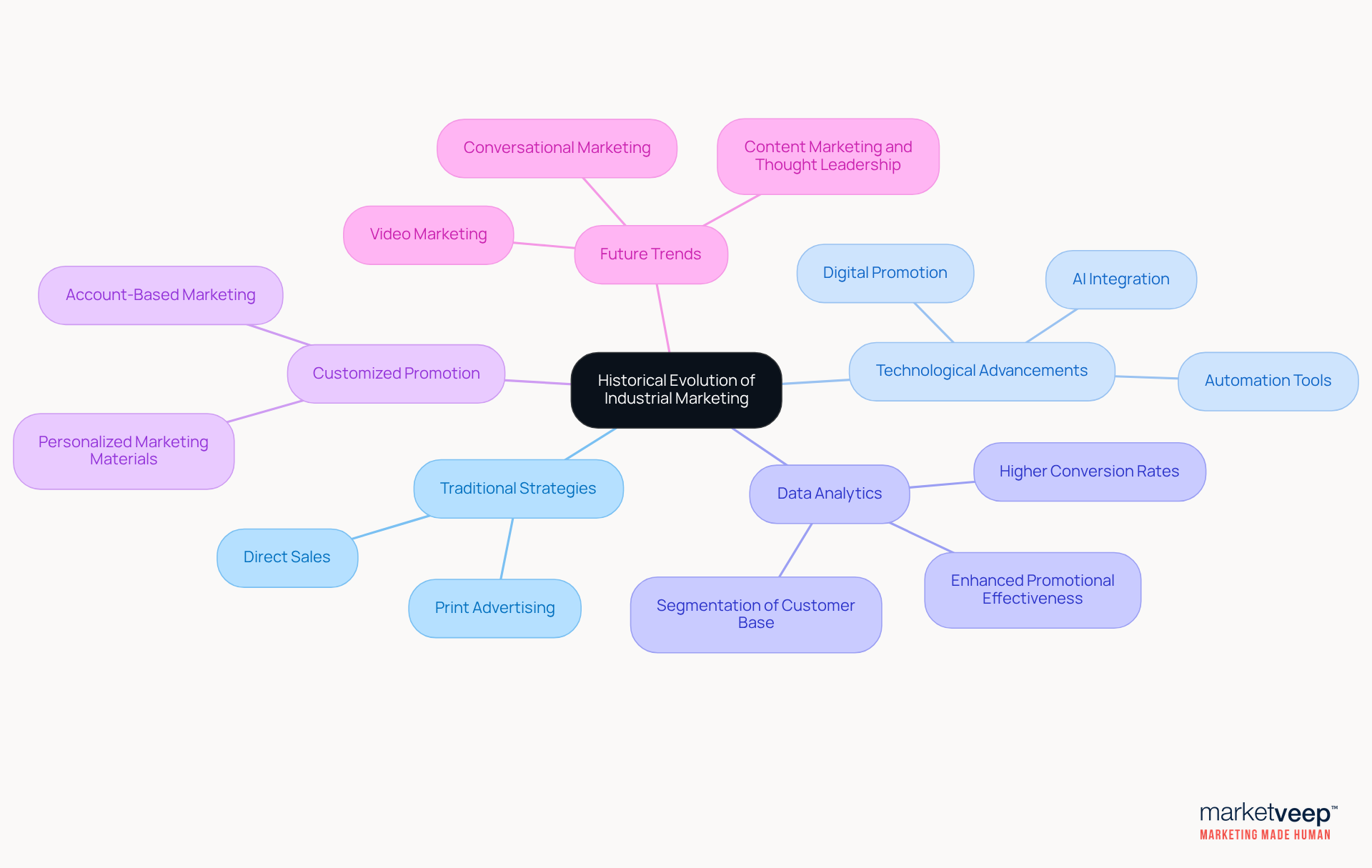
Significance of B2B Marketing: Targeted Strategies for Industrial Success
B2B promotion, as a form of industrial marketing, is crucial in the manufacturing sector, where targeted strategies are essential for effectively reaching decision-makers. By understanding the unique needs and challenges of business customers, companies can craft promotional campaigns that resonate with their audience. This process involves:
- Leveraging data-driven insights to create tailored content
- Implementing account-based strategies
- Focusing on nurturing long-term relationships with customers to foster sustainable growth
As Bill Bishilany aptly states, 'Building and maintaining strong relationships is foundational in industrial marketing. Here’s why: Become a Trusted Advisor: Establishing credibility leads to repeat business and referrals.'
Furthermore, Market Veep emphasizes the importance of customer-centric communication strategies, ensuring that promotional efforts are customized to meet the distinct requirements of each individual. By examining our case studies, companies can witness the tangible results we've achieved for partners across various sectors, demonstrating verified ROI and the effectiveness of our tailored solutions.
Navigating the challenges of data privacy is also imperative, ensuring that personalized promotional efforts adhere to regulations while respecting client boundaries. By integrating digital tools such as SEO, PPC advertising, and email marketing, companies can enhance their marketing effectiveness and achieve higher conversion rates, ultimately positioning themselves for success in the evolving landscape of 2025.
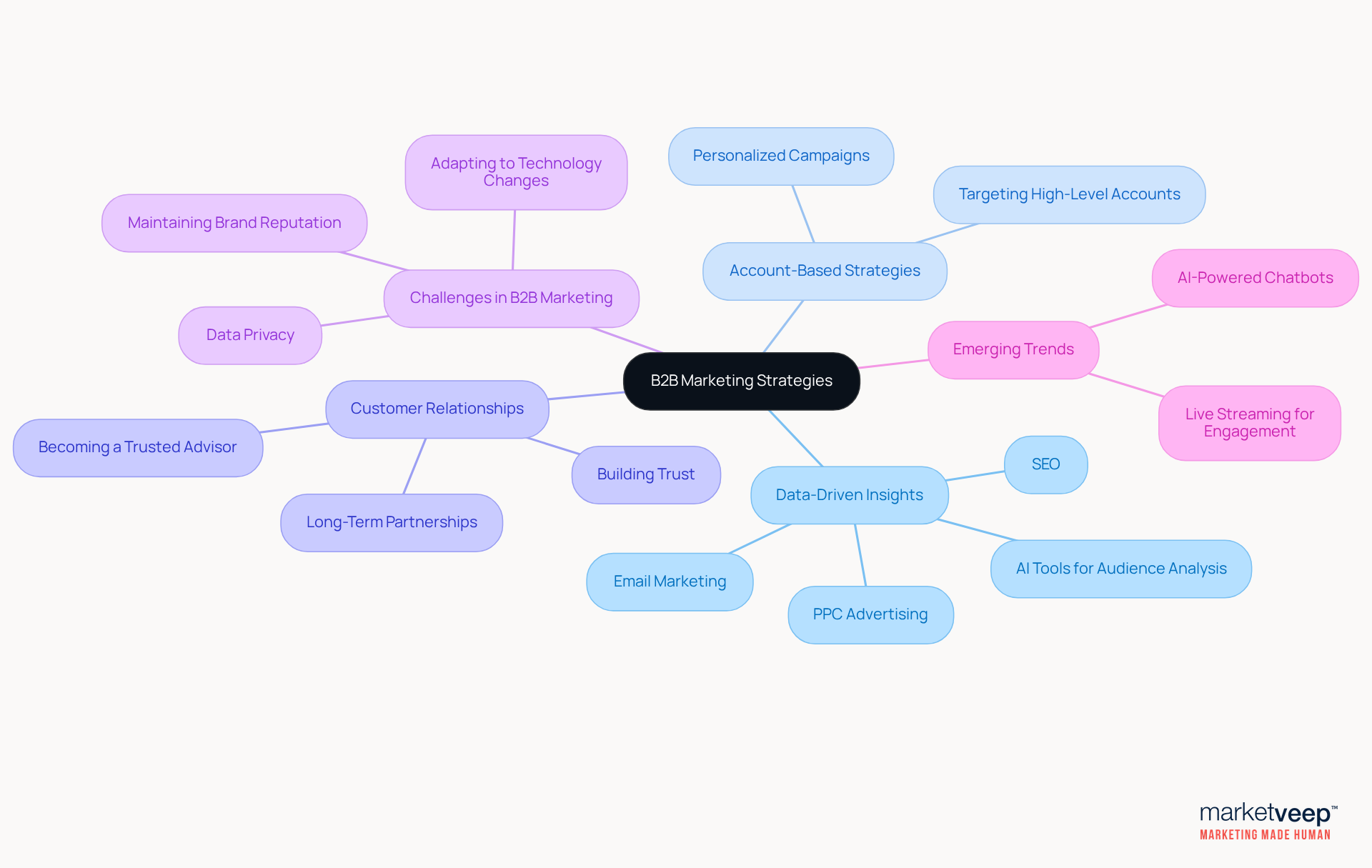
Conclusion
The landscape of industrial marketing is poised for transformative changes by 2025, propelled by innovations in technology and shifting customer expectations. Businesses must embrace tailored strategies to meet the growing demand for personalization, account-based marketing, and the integration of artificial intelligence, all aimed at enhancing customer engagement and driving measurable results.
Key trends underscore the importance of:
- Zero-click SEO
- The influence of video marketing
- The effectiveness of AI-driven tools in optimizing promotional efforts
The transition towards conversational marketing and the utilization of chatbots further streamline customer interactions, while content marketing and thought leadership serve to establish authority within the industry. As companies navigate these trends, they must also confront challenges such as:
- Resistance to change
- Budget constraints
These challenges can impede effective adoption.
Looking ahead, the successful implementation of these strategies will be vital for organizations striving to excel in the competitive industrial sector. By embracing innovation and cultivating a culture of adaptability, businesses can enhance their marketing effectiveness and forge lasting relationships with clients. The future of industrial marketing hinges on a steadfast commitment to understanding customer needs and leveraging data-driven insights to create impactful, personalized experiences.
Frequently Asked Questions
Market Veep's focus for 2025 is on developing customized promotional plans that utilize data-driven insights to create targeted campaigns, enhancing engagement and yielding measurable results.
Market Veep specifically targets sectors such as manufacturing and energy, understanding their unique challenges to formulate effective industrial marketing strategies.
Key trends include the increasing importance of zero-click SEO and video marketing, which are essential for navigating the evolving landscape of industrial marketing.
Market Veep integrates HubSpot Sales Hub automation and reporting to empower sales teams in identifying scaling opportunities without needing additional hires.
Establishing robust monitoring systems is essential for tracking progress and adjusting plans based on real-time data insights, promoting sustainable growth and maximizing ROI.
Personalization is a cornerstone of industrial marketing approaches, with account-based strategies (ABM) allowing companies to customize messaging for specific high-value clients, enhancing customer engagement.
Companies implementing ABM can witness revenue increases of over 200% when executed effectively, highlighting its power in driving business growth.
80% of B2B firms report utilizing hyper-personalization within their ABM strategies, indicating a significant shift towards more tailored promotional efforts.
The implementation of clean, integrated data analytics tools is essential for effectively segmenting audiences and delivering personalized content that meets the unique needs of each segment.
Artificial intelligence is set to revolutionize industrial marketing by enhancing efficiency through predictive analytics, enabling marketers to anticipate customer behavior and create targeted promotional campaigns.
Statistics reveal that 95% of marketers intend to amplify their investments in AI technologies, recognizing their potential to elevate revenue and streamline operations.
AI-driven chatbots offer real-time support and information to prospective clients, improving response times and gathering data on customer preferences to refine marketing strategies.
Companies should assess their existing AI capabilities, consider incorporating predictive analytics into their promotional strategies, and explore specific sales automation tools to optimize their processes for enhanced results.











